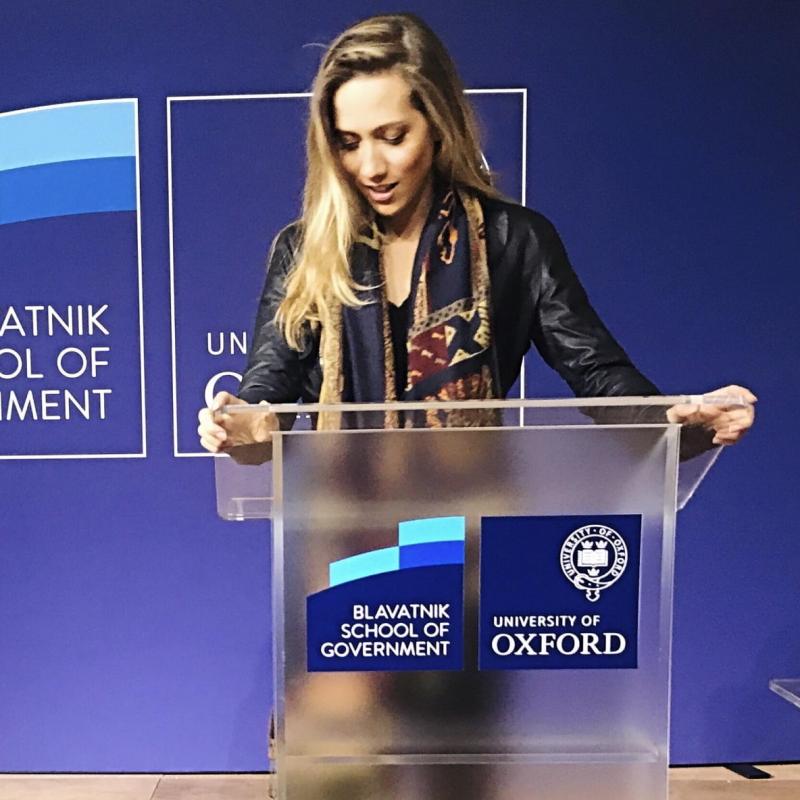Breadcrumb
Britt Titus (MPP 2017) is a humanitarian worker who has worked in international organisations since finishing her undergraduate studies.
In the first few years of her career, she worked on the regional emergency response to the conflict in Syria, and on response to the Ebola crisis in Liberia. These experiences provided Britt with her first glimpses into the importance of human behaviour in humanitarian work. Whether it was the behaviours of the affected population, the government or humanitarian response teams, she saw that much of the response outcomes came down to peoples’ decisions, beliefs, perceptions, and behaviours.
Following this, she wanted to better understand the upstream decisions that led to outcomes she was seeing. She then spent two years with the UN World Food Programme’s office for Asia and the Pacific in Bangkok, working with governments in the region on new policies and programs to improve preparedness for natural disasters.
“In this role I became even more interested in both the policy decisions and the humanitarian-sector decisions that were leading to these either positive or negative humanitarian outcomes.”
Britt knew at this point that she wanted to shift career to a more innovative space where she could think about new approaches to the way humanitarian aid is delivered around the world. Figuring out how to make this shift was the challenge. When she found out about the Master of Public Policy, Britt felt the course’s interdisciplinary nature could provide the space she needed to think through the problems in the humanitarian policy world in different ways.
When preparing to join the MPP back in 2017, Britt Titus spoke with a number of alumni about their experiences on the course. Among them, there was consensus that the people – both students and faculty – are what make the course so special. In fact, a chance encounter with another student in the line for the café in her first few weeks at the School helped Britt give words to the field she had been wanting to explore:
“I remember talking to someone else in the programme and we were asking each other what we were excited about for the course. She told me she was excited about the classes on ‘behavioural science’. Suddenly a lightbulb went off in my head – that’s what it’s called! The part of emergency response work that speaks to me has always been the human component, – why are people behaving in a certain way, what is leading them to make those decisions, and how we can better respond to people’s actual needs within their lived reality and context? I was immediately excited when I found out about behavioural science and started signing up for all the behavioural science courses at Oxford that I could find.”
Though her exploration of this topic at Oxford was fascinating, Britt initially struggled to see how this could form part of her future career. While there was plenty of discussion about applying behavioural science through government or the private sector, there was little to no discussion around this topic in the humanitarian sector. Yet, insightful office hour conversations with professors like behavioural scientist, Dr Eldar Shafir and economist, Professor Stefan Dercon, and completing her summer project at the Behavioural Insights team in London, cemented in her the desire to understand how this work could be applied to the humanitarian world.
After spending some time working in Lebanon for an NGO applying behavioural science to projects related to violence, democracy, human rights, and social cohesion throughout the country, Britt heard that the International Rescue Committee (IRC) were looking to hire a behavioural scientist.
“For this role to come up in behavioural science in a large international humanitarian organisation was a huge moment. I’d explored so many avenues up until then and there were few opportunities in the space at the time.”
Britt was offered the role and moved to their New York headquarters in 2019, where she is now based in the Airbel Impact Lab, IRC’s research and innovation department. Britt now leads the behavioural science team at IRC, which she describes as her current “dream job”, as she gets to work with multidisciplinary teams to design and test solutions with people in crisis and conflict settings, that are innovative, human-centric and based upon rigorous evidence. In this role, she uses behavioural science as an approach to improve humanitarian outcomes ranging from providing education in emergencies, women’s health, treating and preventing child malnutrition, or increasing uptake of mental health services in refugee contexts.

